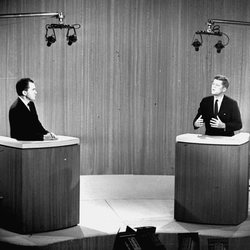False positives and negatives
 Person "A" says the truth 60% of the time, and person "B" does so 90% of the time.
Person "A" says the truth 60% of the time, and person "B" does so 90% of the time.
In what percentage of cases are they likely to contradict each other in stating the same fact?
This section requires Javascript.
You are seeing this because something didn't load right. We suggest you, (a) try
refreshing the page, (b) enabling javascript if it is disabled on your browser and,
finally, (c)
loading the
non-javascript version of this page
. We're sorry about the hassle.
8 solutions
Discussions for this problem are now closed
I disagree with your solution because when they say false at the same time there is a possibility that they say different lie , in that case too they may contradict each other. For instance in the random experiment of throwing a die if the outcome is say 3, then the persons may contradict each other by saying a lie too, say for instance A reports the outcome to be 4 while B reports it to be 6, then they both are telling a lie as well as contradicting each other, you have missed those cases.
The two cases when they contradict each other is:-
(i) A telling the truth and B telling a lie.
(ii) A telling a lie and B telling the truth.
for (i) (60% * 10%) =0.06
for (ii) (40% * 90%) =0.36
either (i) happnes OR (ii) happens
so we get (i) OR (ii)
=> (i) + (ii)
=> 0.06 + 0.36
= 0.42
and in percentage it is 42%
I disagree with your solution because when they say false at the same time there is a possibility that they say different lie , in that case too they may contradict each other. For instance in the random experiment of throwing a die if the outcome is say 3, then the persons may contradict each other by saying a lie too, say for instance A reports the outcome to be 4 while B reports it to be 6, then they both are telling a lie as well as contradicting each other, you have missed those cases.
I did the same way.
I disagree with all solutions because when they say false at the same time there is a possibility that they say different lie , in that case too they may contradict each other. For instance in the random experiment of throwing a die if the outcome is say 3, then the persons may contradict each other by saying a lie too, say for instance A reports the outcome to be 4 while B reports it to be 6, then they both are telling a lie as well as contradicting each other, you have missed those cases.
seem to be an extremely hard question because the lies is various :(
but the problem can still be solved using the concept of "The Value Of Testimony" (see Hall and Knight)
In this question case, it means just yes or no, just 2 answer. So the lies is not going to contradict...
Notice that one has to be telling the truth and the other one has to be lying. Knowing that we can get the probability of A intersection Not B and B intersection Not A by multiplying them and the andding the results. P(A) P(NotB) + P(B) P(NotA) Plugging in the numbers we get that: (.9)(1-.6)+(.6)(1-.9) The probability is .42, or 42%.
Python:
1 2 3 4 5 6 7 8 9 10 |
|
i think u dont know what you've got.
Bayes theorem P(a)/P(a)+P(b) 0.6/0.6+0.9 =0.42
I am confused about your question. It takes a chance that both of them are lying but in different way. Then we can't provide the exactly answer.
Notice that either (person A is telling the truth and person B is lying) or (person B is telling the truth and person A is lying). This is the same as (90% (100-60)%)+(60% (100-90)%)=36%+6%=42% I will add latex later.
when they both say true the probability is 60*90/100=54;
when the both say false at same time is 40*10/100=4;
so the say always the same fact is 54+4=58%;
so the percentage of cases that they contradict each other is 100-58=42%